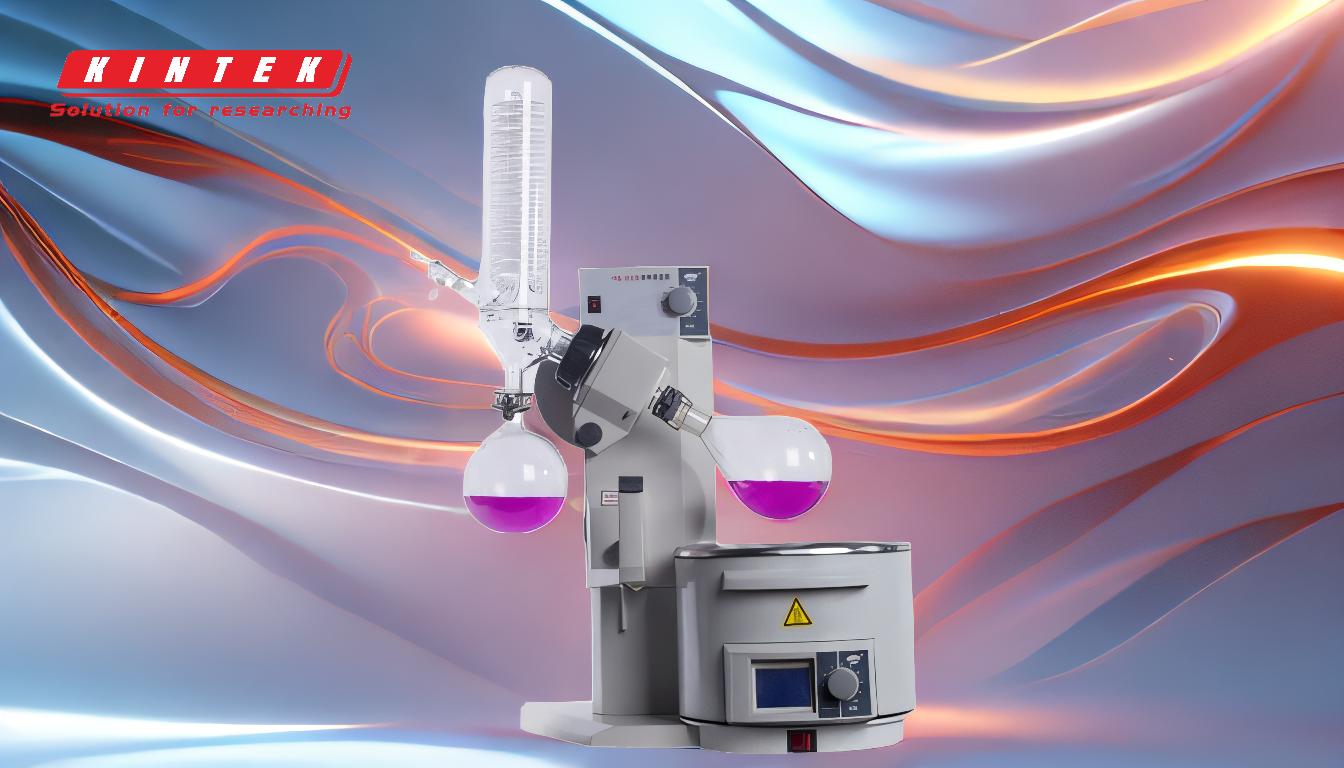Rotary evaporators and freeze drying are two distinct methods used for solvent removal and sample preparation, each with unique mechanisms, applications, and advantages. Rotary evaporators rely on heat and reduced pressure to evaporate solvents, offering versatility and efficiency for bulk solvent removal. Freeze drying, on the other hand, involves freezing the sample and sublimating the solvent under vacuum, preserving the sample's structure and integrity. While rotary evaporators are faster and more versatile for general solvent evaporation, freeze drying is ideal for heat-sensitive materials and applications requiring structural preservation. Below, the key differences are explained in detail.
Key Points Explained:

-
Mechanism of Operation:
-
Rotary Evaporator:
- Uses a heated fluid bath (water or oil) to heat the sample.
- Operates under reduced pressure to lower the boiling point of the solvent, enabling efficient evaporation.
- The sample flask rotates to increase the surface area, enhancing evaporation rates.
-
Freeze Drying:
- Begins by freezing the sample to solidify the solvent.
- The frozen solvent is then sublimated directly from solid to gas under vacuum, bypassing the liquid phase.
- This process is slower but preserves the sample's structure and is ideal for heat-sensitive materials.
-
Rotary Evaporator:
-
Heat Application:
-
Rotary Evaporator:
- Heat is applied directly to the sample via the heated bath, which can be adjusted for temperature control.
- Suitable for solvents with higher boiling points and samples that can tolerate moderate heat.
-
Freeze Drying:
- No direct heat is applied to the sample. Instead, the process relies on sublimation under vacuum.
- Ideal for heat-sensitive samples, such as biological materials, pharmaceuticals, and food products.
-
Rotary Evaporator:
-
Speed and Efficiency:
-
Rotary Evaporator:
- Faster for bulk solvent removal due to the combination of heat and reduced pressure.
- Processes one sample at a time but is efficient for large volumes of solvent.
-
Freeze Drying:
- Slower due to the need for freezing and sublimation.
- However, it is more efficient for preserving sample integrity and is often used as a downstream process after initial solvent removal with a rotary evaporator.
-
Rotary Evaporator:
-
Sample Preservation:
-
Rotary Evaporator:
- May alter the structure of heat-sensitive samples due to the application of heat.
- Suitable for samples where structural integrity is not a primary concern.
-
Freeze Drying:
- Preserves the sample's structure, making it ideal for delicate materials like proteins, enzymes, and certain food products.
- Ensures minimal degradation of the sample during the drying process.
-
Rotary Evaporator:
-
Applications:
-
Rotary Evaporator:
- Widely used in chemistry labs for solvent recovery, concentration, and purification.
- Versatile and suitable for a broad range of solvents and sample types.
-
Freeze Drying:
- Commonly used in pharmaceuticals, biotechnology, and food industries for preserving sensitive materials.
- Essential for applications requiring long-term storage and stability of samples.
-
Rotary Evaporator:
-
Equipment and Setup:
-
Rotary Evaporator:
- Consists of a rotating flask, heated bath, condenser, and vacuum pump.
- Requires regular maintenance of the vacuum system and fluid bath.
-
Freeze Drying:
- Comprises a freeze-drying chamber, vacuum pump, and condenser to trap sublimated solvents.
- More complex setup and higher initial cost compared to rotary evaporators.
-
Rotary Evaporator:
-
Surface Area and Heat Transfer:
-
Rotary Evaporator:
- The rotating flask increases the sample's surface area, improving heat transfer and evaporation rates.
- This feature makes it efficient for bulk solvent removal.
-
Freeze Drying:
- The larger surface area of the frozen sample, often achieved using a rotary evaporator for pre-freezing, enhances heat transfer during sublimation.
- This speeds up the freeze-drying process downstream.
-
Rotary Evaporator:
-
Versatility:
-
Rotary Evaporator:
- Highly versatile and can handle a wide range of solvents and sample volumes.
- Suitable for both small-scale and industrial applications.
-
Freeze Drying:
- Specialized for applications requiring sample preservation and structural integrity.
- Less versatile in terms of solvent types but unmatched in its niche applications.
-
Rotary Evaporator:
In summary, rotary evaporators and freeze drying serve different purposes and are chosen based on the specific requirements of the sample and application. Rotary evaporators excel in speed and versatility for solvent removal, while freeze drying is unparalleled in preserving sample integrity for sensitive materials. Understanding these differences helps in selecting the appropriate method for your needs.
Summary Table:
| Feature | Rotary Evaporator | Freeze Drying |
|---|---|---|
| Mechanism | Heat and reduced pressure for solvent evaporation. | Freezing and sublimation under vacuum. |
| Heat Application | Direct heat applied via a heated bath. | No direct heat; relies on sublimation. |
| Speed | Faster for bulk solvent removal. | Slower due to freezing and sublimation. |
| Sample Preservation | May alter heat-sensitive samples. | Preserves sample structure and integrity. |
| Applications | Chemistry labs for solvent recovery, concentration, and purification. | Pharmaceuticals, biotechnology, and food industries for sensitive materials. |
| Equipment Setup | Rotating flask, heated bath, condenser, and vacuum pump. | Freeze-drying chamber, vacuum pump, and condenser. |
| Versatility | Highly versatile for a wide range of solvents and sample volumes. | Specialized for sample preservation and structural integrity. |
Still unsure which method is right for your needs? Contact our experts today for personalized advice!











